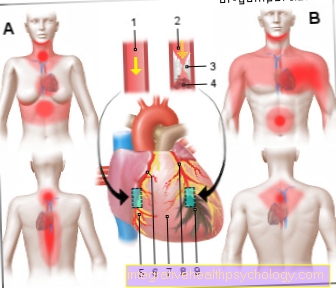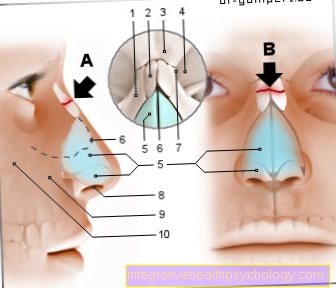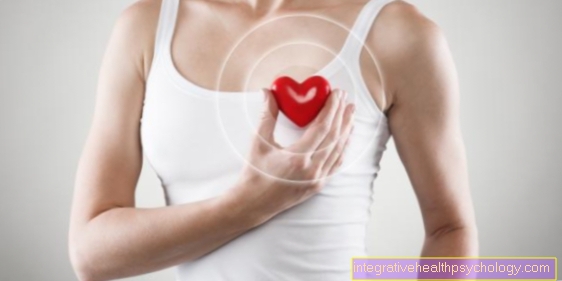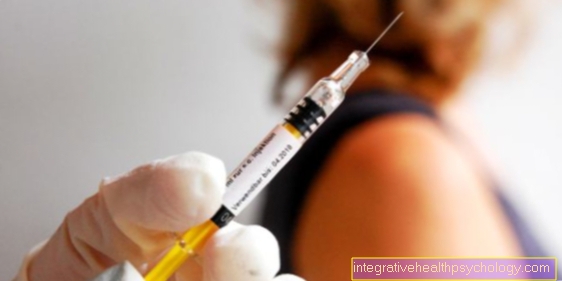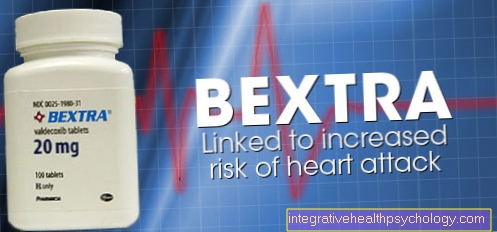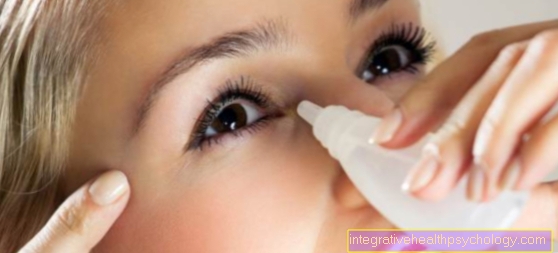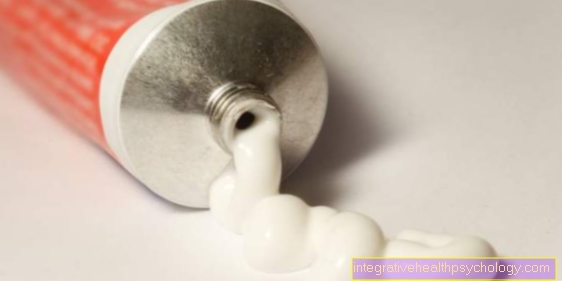Stress hormones
Definition of stress hormones
The term stress hormones encompasses all biochemical messenger substances in our body that are involved in the physical stress response as a result of a stressor. The purpose of this reaction is to increase efficiency in order to prepare for an impending fight or flight.
The most important hormones involved in the stress response include the group of catecholamines and glucocorticoids. The former is largely responsible for our body's reaction within seconds and primarily comprises the hormones adrenaline and noradrenaline. They cause an increase in our heart rate and blood pressure and a release of energy reserves. With a little delay, the concentration of glucocorticoids increases, above all the most well-known stress hormone cortisol. Both major groups of stress hormones are largely produced in the adrenal gland.

What stress hormones are there?
The most important stress hormones can be assigned to two larger groups, the catecholamines and the glucocorticoids.
Probably the best-known stress hormone cortisol belongs to the latter group and its effects in the body are very diverse. In addition to its influence on the cardiovascular system, cortisol causes a release of energy reserves and a modulation of our electrolyte and water balance. It also has an immunosuppressive and anti-inflammatory effect.An increase in cortisol is usually only noticeable with prolonged stress.
The catecholamines, on the other hand, play the main role in acute stressful situations. The main representatives of this group are adrenaline, noradrenaline and dopamine. They cause a rapid increase in heart rate and blood pressure, increased sweating and an increase in our muscle tone.
In addition to the most important stress hormones mentioned, there are a number of other hormones such as prolactin and β-endorphin, which increase their levels under stress. However, their role in the stress response has not yet been clarified in detail.
Also read: Are you stressed? - These are the signs
Cortisol
Cortisol is one of the most important hormones in our body. It belongs to the group of so-called glucocorticoids, which in turn belong to the group of steroid hormones.
The main task of cortisol is to mobilize energy reserves, regulate our immune system and increase our alertness. It also causes the heart to beat faster, which in turn increases blood pressure. All of these functions are essential parts of the body's response to prolonged stress.
The formation of cortisol is a very regulated process that takes place via various signaling pathways. The hypothalamus, a region in the midbrain, releases the hormone ACTH, which in turn affects the pituitary gland (pituitary gland). This releases the hormone CRH, which stimulates the adrenal cortex to produce cortisol. The aforementioned functions of cortisol are essential for our body to cope with stressful physical and mental situations. However, if the load continues, the negative effects of cortisol will outweigh the effects over time, which can result in exhaustion and dysregulation in our body.
You might also be interested in this topic: The effects of cortisone
adrenaline
The hormone adrenaline belongs to the group of so-called catecholamines. Other well-known hormones from this group are norepinephrine and dopamine. Adrenaline is mainly produced in the adrenal cortex and released in dangerous situations, in cold and warm conditions, physical work and psychological stress.
In its function as a stress hormone, adrenaline has a wide variety of effects in our body. In this way, it causes an increase in the ability to contract and a fast heart rate in the heart. In addition, adrenaline constricts the blood vessels, which leads to increased blood pressure. It also causes the airways to widen. In addition to mobilizing energy reserves, adrenaline inhibits body functions that would use up energy unnecessarily in a stressful situation, such as digestion.
Read more about this: adrenaline
Thyroid hormones
Even if the thyroid hormones are generally not counted among the classic stress hormones, there is still a large overlap between their effects and that of adrenaline or cortisol.
However, your blood level does not depend on the occurrence of stressful situations. As the name suggests, these hormones are made in the thyroid gland. The most important representatives are tyroxine (T4) and triiodothyronine (T3). Even if the latter is the much more active form of the thyroid hormones, the thyroid gland produces 90% tyroxine. However, this is converted to the more effective T3 in the cells of the target organ.
The effect of the thyroid hormones is extremely diverse. So they basically cause an increase in physical activity, in the sense of an increase in heart and breathing frequency, cause an increased production of red blood cells and lead to increased motility of the intestine.
The exact mechanisms have not yet been clarified in detail, but many of the effects of thyroid hormones can be traced back to an increase in the effects of catecholamines. In addition to the functions mentioned, the thyroid hormones also play a key role in the development of the body and its adaptation to environmental conditions.
How can you best reduce stress hormones?
Since the strength of the perceived subjectively perceived stress is largely related to the levels of stress hormones, a lowering of the stress hormone level initially means a lowering of the perceived stress.
There are now a number of different methods that can be used to achieve this goal, and their effectiveness can vary greatly from person to person. Thus, the motto here is primarily to try to find the individually most effective remedy for stress. The methods for reducing stress range from the introduction of small rituals in everyday life, through sports activities, yoga, relaxation techniques, meditation and many other possibilities.
One of the best-known exercises that can be assigned to relaxation techniques is progressive muscle relaxation (PMR). In this exercise, specific muscle groups are tensed and relaxed again from complete rest. The focus here is on the perception of relaxation in the muscle. A full session with the PMR involves performing the technique on all muscle groups in the body. When it comes to sporting activity, calm sports are particularly suitable where you can let your mind wander, as is the case, for example, when jogging.
Studies have also shown that many different types of yoga have led to a significant reduction in stress, such as the yoga form of yoga nidra. The focus here is less on physical activity than on the perception of one's own body. However, if you do not have the time to do yoga, exercise or meditation in everyday life, you can try to incorporate small rituals into everyday life. For example, it could be shown that even deep and conscious breathing for 1 minute before starting a stressful task can significantly reduce the perceived stress.
Additional Information: Stress relief
How can you measure the stress hormones?
Most stress hormones such as cortisol, adrenaline, noradenalin etc. can be detected in the blood, urine and saliva.
The values for the level determination by the blood and the saliva can fluctuate strongly in the course of the day. When measuring the hormone level based on the concentration in the urine, it must be ensured that this is collected in a container for 24 hours and the concentration is determined from this in order to compensate for the strong fluctuations described and to be able to make a statement about the mean hormone level.
The normal values for cortisol in the blood sample are between 30 and 225 µg / l. When determined using urine collection, the value is between 21 and 150 µg / l.
Prolactin
The main function of the hormone prolactin in the female body is the remodeling of the breast during pregnancy and the promotion of milk secretion during breastfeeding.
In addition, it triggers, among other things, the psychological reaction of so-called "brood care". It is therefore surprising that prolactin also shows an increase in concentration under stress, as its function is initially not clearly related to the development of the stress reaction. For this reason, it is only partially assigned to the stress hormones.
However, it is known that prolactin can prevent or delay ovulation. For example, the increase in prolactin during stress could be due to the fact that the body prevents pregnancy in a stressful phase, which could have negative consequences for the mother and the child.
Are stress hormones also transmitted into breast milk?
Many different studies in recent years have been able to confirm that stress hormones are transferred into breast milk and thus also get into the child's organism. In principle, however, this initially has no relevant consequences for the child, unless the level remains at a very high level for a longer period of time.
The consequences of prolonged exposure of the child to stress hormones in breast milk is currently the subject of lively research. Among other things, possible changes in behavior such as low impulsivity and increased nervousness and motor coordination disorders are discussed. It should be noted, however, that most of these studies have only been carried out on monkeys.
Even if the scientific evidence is still pending, an attempt should still be made to create a stress-free environment for the offspring and to keep the own stress level as a mother as low as possible.
You may also be interested in this topic: Stress in Pregnancy
How does exercise affect the stress hormones?
The exact mechanism through which light to moderate exercise leads to a lowering of the stress level and thus to a lowering of the stress hormones has not yet been fully clarified.
It is assumed, however, that this effect is based on two different mechanisms. On the one hand, doing sport often creates psychological relaxation, since sport can serve as a distraction from other problems.
However, it is also believed that a direct biochemical process in our body plays a role in reducing stress through exercise. The "happiness hormones" serotonin and dopamine increase during sporting activity. It is postulated that these promote the breakdown of stress hormones and thus also lead to a reduction in the stress reaction.
Hair loss due to stress hormones
The direct connection between a high stress level and thus increased stress hormone levels and hair loss has been clarified more and more precisely in recent years.
It is assumed that high levels of stress hormones, especially norepinephrine, lead to an increased formation of nerve cells around the hair follicles. If this happens during the transition of the hair follicles from the growth phase to the so-called transition phase, the result is a local inflammatory reaction, which can then lead to premature hair loss.
Also read:
- Consequences of stress
- Causes of Hair Loss
Weight gain from stress hormones
The extent to which stress affects weight initially depends on the type of stress.
In the case of acute stress, adrenaline and noradrenaline in particular are produced, which result in reduced food intake and increased energy expenditure. With acute stress, you tend to lose weight.
However, if this stress persists longer, the stress hormone cortisol is increasingly produced, which means that you eat more sugary and fatty foods. In addition, cortisol means that the newly formed fat is more likely to attach to the stomach and neck than to other parts of the body. In severe cases, one speaks of so-called trunk obesity. To what extent the strength of the chronic stress affects the weight is still controversial, as there are different results.
You may also be interested in the following topics:
- Symptoms of stress
- These are the typical symptoms of Cushing's syndrome


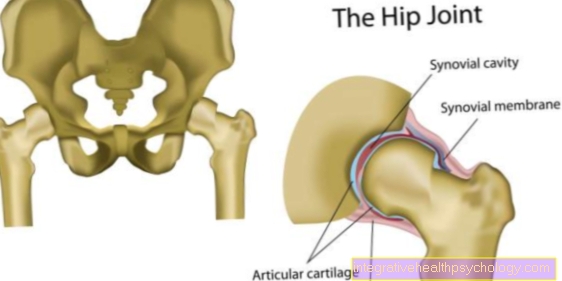





.jpg)

